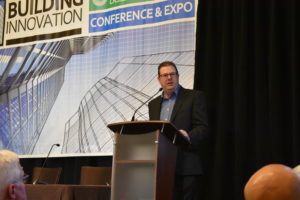
Resilience benchmarks for U.S. communities released
The International Code Council and the Alliance for National & Community Resilience (ANCR) released its community resilience benchmarks on buildings during the Plenary Keynote Luncheon held at Building Innovation 2019: The National Institute of Building Sciences Seventh Annual Conference and Expo. This pilot document, the first in a series of community benchmarks, focuses on providing communities with a mechanism to evaluate their current state of resilience and a guide for areas in which they can improve.
Buildings house many of the most critical functions of our communities, including schools, hospitals, businesses and residences. These benchmarks are especially critical in providing community leaders the necessary tools to create safer and more resilient structures. The buildings benchmarks consist of nine requirements aimed at increasing the resilience of our communities, including the adoption, administration and enforcement of building codes. In particular, the benchmarks encourage local governments to adopt building codes and to provide the human, technical and financial resources necessary to support permitting, plan review and inspections.

“A holistic approach to identifying and incorporating resilience measures into a community’s building stock, including the adoption of the latest building codes, supports the mitigation of damage from natural disasters and increases the overall resiliency of our communities,” said ANCR Executive Director Ryan Colker. “These benchmarks provide a standard for local and state governments to follow ensuring they are well prepared for the next disaster.”
The Community Resilience Benchmarks system is intentionally cross-sector, encompassing elements including, but not limited to, communications, housing, water, food distribution, energy, waste management, finance, education, public health, transportation, public safety and business. This will consolidate existing assessments, certifications and research to serve as a useful, centralized tool to help communities, businesses, governments and people make decisions to become more resilient, based on consistent and comparable information — on where to live, where to invest, what to prioritize and how to measure progress.
Related:
ANCR announces a distinguished group of specialists
ANCR Water Technical Committee formed
Experts convene on resilient buildings benchmarks
ICC & ANCR join Resilient Nation Partnership Network
Schmidt: “We are only as strong as our communities’ weakest link”
The city of Washington, D.C., expressed interest in evaluating the ANCR buildings benchmarks as it undertakes resilience planning and evaluates its current building stock.
“We are excited to work with Washington, D.C., to help support their efforts to become a more resilient city,” commented ANCR Board Chairman Maj. General Warren C. Edwards USA (Ret.). “The standards laid out in our buildings benchmarks will prove an invaluable resource as D.C. plans for the future, and we look forward to partnering with other local governments in the future.”
A number of state and local government officials contributed to the development of the buildings benchmarks, including representatives from the Virginia Department of Housing and Community Development and the New York City Department of Buildings. Representatives from across the building industry, including designers, manufacturers, trade groups and nonprofits, were also involved in the development of the benchmarks.
A part of the ICC Family of Companies, ANCR is a national coalition aimed at improving resilience and implementing good community practices in towns and cities across the United States and helping cities prevent infrastructure failure caused by natural and other disasters, thereby avoiding negative social, economic and welfare repercussions caused by such damages. ANCR’s primary objective is the development of a system of community benchmarks — the first system of its kind in the United States — that will allow local leaders to easily assess and improve their resilience across all functions of a community. When adverse events occur, all gears in the local system must continue to function. ANCR intends to give communities a voluntary, transparent, usable, and easily understandable accredited self-assessment that helps to showcase their whole-community resilience and provides a simple gauge of how their resilience continues to strengthen.
The Code Council believes in a “whole community” approach toward building resiliency in the built environment, which begins with strong, regularly adopted and properly administered building codes and ends with communities look across all of its interconnected functions to truly be a resilient community. Click here to view the many resources ICC offers to assist jurisdictions, manufacturers and the public with resilient building practices.
Throughout 2019, ANCR will engage subject matter experts in the development of additional Benchmarks, including housing, business, energy and water infrastructure. If you are interested in participating in the development of future benchmarks as a subject matter expert, please contact ANCR Executive Director Ryan Colker.








